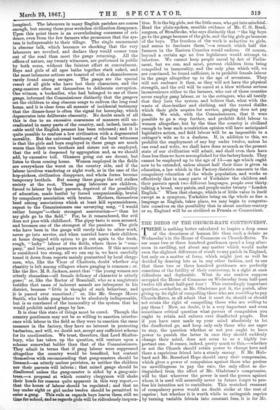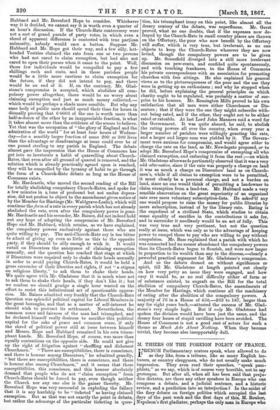THE DREGS OF THE CHURCH-RATE CONTROVERSY. T HERE is nothing better
calculated to inspire a deep sense of the dreariness of human life than such a debate as Wednesday's in the House of Commons on Church-Rates. To see some two or three hundred gentlemen spend a long after- noon in cavilling, not about any matter which would make even the slightest difference of result to any parish in England, but only on a matter of form, which might just as well be decided by drawing lots as in any other fashion, and to see that these two or three hundred gentlemen are perfectly conscious of the futility of their controvesy, is a sight at once ridiculous and deplorable. What do our readers suppose occupied the House of Commons on Wednesday from half-past twelve till about half-past four ? This exceedingly important question,—whether, as Mr. Gladstone put it, the parish, after giving up its right of compelling those who are unwilling to pay Church-Rates, as all admit that it must do, should or should not retain the right of compelling those who are willing to pay them ? Now, no doubt, it is a very important and even sometimes critical question what powers of compulsion you ought to retain and enforce over disaffected people. But if you have once made up your mind absolutely to let the disaffected go, and keep only only those who are eager to stay, the question whether or not you ought to have power to punish the latter in case they should suddenly change their mind, does not seem to us a highly im- portant one. It comes, indeed, pretty much to this,—whether or not the Church should retain power to change here and there a capricious friend into a steady enemy. If Mr. Hub- bard and Mr. Beresford Hope should carry their compromise, which gives a power of compulsion against those who profess no unwillingness to pay the rats, the only effect as dis- tinguished from the effect of Mr. Gla.dstone's compromise, will be that wherever the power is used the person against whom it is used will assuredly never in future forget to pro- fess his intention not to contribute. This wretched remnant of compulsory power would no doubt strike at the root of caprice ; but whether it is worth while to extinguish caprice by turning variable friends into constant foes, it is for Mr.
Hubbard and Mr. Beresford Hope to consider. Whichever way it is decided, we cannot say it is worth even a quarter of an hour's discussion. If the Church-Rate controversy were
not a sort of grand parade of party votes, in which even a shred of apparent difference is contested with true partizan animosity, nobody would care a button. Suppose Mr. Hubbard and Mr. Hope got their way, and a few silly, hot- headed Vestries claimed the rate from one or two persons who had not cared to claim exemption, but had also not cared to open their purses when it came to the point. Well, those few individuals would be compelled to pay a few shillings each and costs, and in those parishes people would be a little more cautious to claim exemption for the future, if they did not intend to pay, and there would be an end of it. If, on the contrary, Mr. Glad- stone's compromise is accepted, which abolishes all com- pulsory power altogether, there would be no worry about claiming exemption and just as much money collected,— which would be perhaps a shade more sensible. But why any sane body of public men should spend their time for hours in dismally proving that 6.0001 of the one is worth more than half-a-dozen of the other by an inappreciable fraction, is what it takes almost more than the evidence of the senses to believe. Yet that was the occupation of "the glory of England and the admiration of the world" for at least four hours of Wednes- day—for a sensibly larger fraction of some 200 or 300 lives than the advantage or disadvantage at issue could ever be of one pound sterling to any parish in England. The debate almost gave the impression that the House of Commons has got into so inveterate a habit of quarrelling about Church- Rates, that even after all ground of quarrel is removed, and the solution which is already practically agreed upon is reached, they will be compelled by the tyranny of habit to go through the form of a Church-Rate debate as long as the House of Commons exists.
Mr. Hardeastle, who moved the second reading of the Bill for totally abolishing compulsory Church-Rates, and spoke for a few minutes in atone of profound but not undue depres- sion, did not profess to object to the amendment given notice of by the Member for Hastings (Mr. Waldgrave-Leslie), which will continue theform of a rate in every parish which has not already abolished the rate, even after the compulsory power is gone. Mr. Hardcastle and his seconder, Mr. Baines, did not indeed hold out any hope of adopting the compromise of Mr. Beresford Hope and Mr. Hubbard, which retains, as we have explained, the compulsory powers exclusively against those who are quite willing to pay. The anti-Church-Rate cry is too bitter to admit of giving up even as little as this to the opposite party, if they should be silly enough to wish it. It would entail on Dissenters the annoyance of claiming exemption annually, and the question has reached that stage at which if Dissenters were required only to shake their heads annually in order to avoid paying Church-Rates, it would be held a gross surrender of their liberties and rights, if not "a stigma on religious liberty," to ask them to shake their heads. We quite agree with Mr. Gladstone that it is much wiser not to ask them to shake their heads, if they don't like it ; but we confess we should grudge a single hour wasted on the effort to resist this infinitesimal act of questionable oppres- sion. Mr. Baines admitted very frankly that the Church-Rate Question was splendid political capital for Liberal Members in the great boroughs, and that as a matter of self-interest he should wish to protract its settlement. Nevertheless, the common sense and fairness of the man had triumphed, and he declared himself really desirous to sacrifice this political capital for the sake of peace and common sense, if only the shred of political power still at issue between himself and Messrs. Hope and Hubbard remained in his own trium- phant hands. Mr. Beresford Hope, of course, was more than equally contentious on the opposite side. He could not give up the right of litigation against "shuffling and dishonest Churchmen." "There are susceptibilities, there is conscience, and there is honour among Dissenters," he admitted grandly, "but there are susceptibilities, there is conscience, and there is honour also among Churchmen," and it seems that these susceptibilities, this conscience, and this honour absolutely demand that people who do not "claim exemption" from Church-Rates should be forced to pay, even though neither the Church nor any one else is the gainer thereby. Mr. Beresford Hope was very successful in exploding the fallacy that it is any hardship to be " ticketed " as having claimed exemption. But as that was not exactly the point in debate, but rather the advantage of the particular ticketing in ques-
tion, his triumphant irony on this point, like almost all the dreary oratory of the debate, was superfluous. Mr. Gorst proved, what no one doubts, that if the expenses now de- frayed by the Church-Rate in small country places are thrown on the Offertory, the poor who now benefit by the Offertory will suffer, which is very true, but irrelevant, as no one objects to keep the Church-Rates wherever they are now levied, though the compulsory powers are to be given
up. Mr. Scourfield diverged into a still more irrelevant discussion on pew-rents, and confided quite spontaneously, and with touching frankness, to the House of Commons his private correspondence with an association for promoting churches with free sittings. He also explained his general views as to the picturesqueness of the poor and the use they were in getting up an enthusiasm ; and why he stopped when he did, before explaining the general principles on which charity ought to be regulated, was probably a matter of sur- prise to his hearers. Mr. Remington Mills proved to his own satisfaction that all men were either Churchmen or Dis- senters ; that if they were the one they might subscribe with- out being rated, and if the other, they ought not to be either rated or rateable. At last Lord John Manners said a word for the Government. It was quite absurd, he said, to abolish the rating powers all over the country, when every year a larger number of parishes were willingly granting the rate, and a larger and larger sum was yielded by it. The Govern- ment were anxious for compromise, and would agree either to charge the rate on the land, as Mr. Newdegate proposed, or to adopt Mr. Beresford Hope's compromise of exempting all who claimed exemption, and enforcing it from the rest ;—on which Mr. Gladstone afterwards pertinently observed that it was a very odd alternative, since if the rate was properly a charge on land it was as much a charge on Dissenters' land as on Church- men's, while if all claims to exemption were to be permitted, it must clearly be a personal charge, and not a burden on land, since no one would think of permitting a landowner to claim exemption from a land-tax. Mr. Hubbard made a very sensible observation on the great superiority of• an organized rate over mere voluntary subscription-lists. He asked•if any one would propose to raise the money for public libraries by mere subscription, instead of by the library rate. Rating is the expedient of a civilized State, which studies to obtain some equality of sacrifice in the contributions it asks for, and to surrender it needlessly would be an act of folly. This was very true and very pertinent, but not the question really at issue, which was only as to the advantage of keeping power to compel those to pay who are willing to pay without compulsion. Mr. Bass explained that a parish with which he was connected had no sooner abandoned the compulsory powers than its Church-Rates began to flourish, and were now larger in proportion to its wealth than any in the diocese,—clearly a powerful practical argument for Mr. Gladstone's compromise.
And so the debate droned on without significance or spirit, till Mr. Gladstone at length pointed out clearly on how very petty an issue they were engaged, and how easy it would be, as no real difficulty either of form or of substance existed, to engraft on the Bill for the total abolition of compulsory Church-Rates, the amendments of the Member for Hastings, which continue all the machinery of rating after the abolition of the compulsory powers. A majority of 76 in a House of 450,-263 to 187, larger than any for eight years back,—attested the success of Mr. Glad- stone's very simple logic. But if only Mr. Gladstone had spoken the division would have been just the same, and the dreary four hours of stupid cavilling have been avoided. The House of Commons is not a good cast of actors for such a theme as Much Ado About Nothing. When they become trivial, they become also insupportably dull.































 Previous page
Previous page